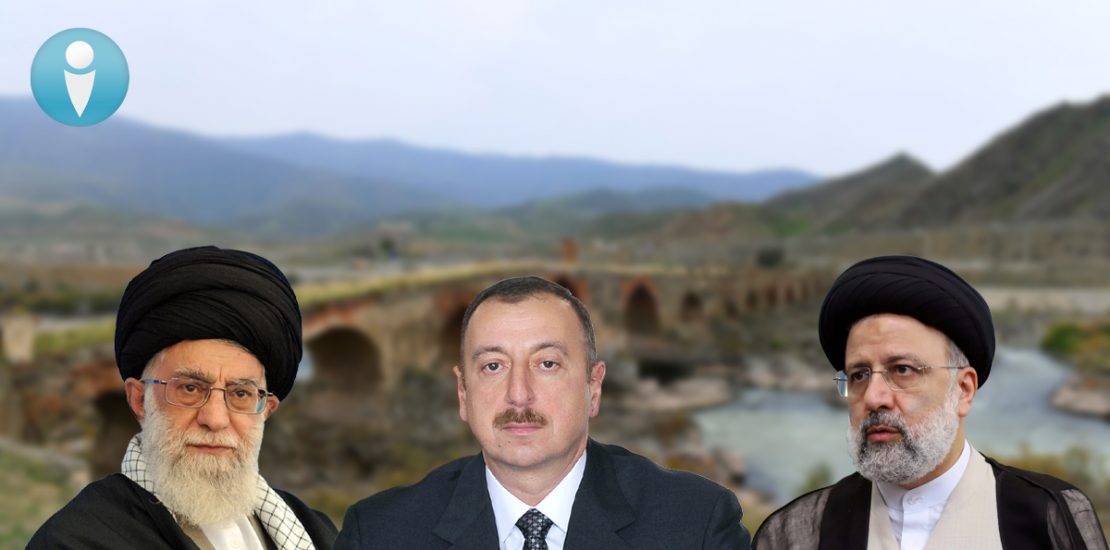- 9 November, 2021
- Foreign Policy

The telephone conversation between the Foreign Ministers of Iran and Azerbaijan on November 6, 2021, effectively ended yet another round of tensions in the Iranian-Azerbaijani relations during and following the Artsakh war. In particular, the Foreign Minister of the Islamic Republic of Iran Hossein Amir-Abdollahian told his Azeri counterpart that “in recent months, parties that do not like the good relations between Iran and Azerbaijan have become more active, but due to the wisdom of officials of the two countries, all differences have been settled.”
During the 44-day war and in the following period, especially during the Iranian military exercises near the territories under the control of Azerbaijan, some Armenian media outlets and expert circles continued to form positive expectations from Iran.
Iran has not maintained diplomatic neutrality between “brotherly” Azerbaijan and “neighbor” Armenia
Since the start of the Second Artsakh War, various high-ranking officials of the Iranian military-political leadership repeatedly expressed concern over the outbreak of hostilities, called for an end to them, and condemned the targeting of civilian infrastructure and the population. However, even during the hottest days of the war, these concerns did not prevent official Tehran from failing to maintain neutrality in its diplomatic rhetoric. It is also noteworthy that during the war, pro-Azerbaijani statements made by the highest official circles of that country rarely appeared on Armenian media propaganda platforms.
Thus, on October 7, 2020, the then President of Iran Hassan Rouhani stated that although a military solution to the Nagorno-Karabakh conflict is not acceptable to Tehran, they “support the restoration of Azerbaijan’s territorial integrity.” Of special interest is the part in Rouhani’s words in which he warns Baku and Yerevan, emphasizing the security of the country’s northern borders jeopordized by the hostilities in Artsakh. He is referring to the former as “brotherly Azerbaijan” and the latter as “neighboring Armenia.”
On November 3 last year, the Supreme Leader of the Islamic Republic of Iran, Ayatollah Seyyed Ali Khamenei, also spoke about the need to “liberate the territories belonging to Azerbaijan.” “The territories belonging to the Republic of Azerbaijan must be liberated, and the security of Armenian citizens must be guaranteed.” Khamenei’s representatives in the four predominantly Turkic-speaking provinces in the north of the country issued a statement on October 1 saying that Azerbaijan was “acting perfectly legitimately in liberating its lands.”
In the last days of the war, the Iranian side even offered its version of the settlement of the Nagorno-Karabakh conflict, which was first discussed with Turkey and Russia. Iranian Deputy Foreign Minister Abbas Araghchi arrived in Yerevan from Moscow, Ankara and then Baku to present the Iranian version of the conflict resolution. It envisaged “an end to the occupation, protection of the territorial integrity of states, the inviolability of internationally recognized borders, as well as the protection of human rights and the interests of minorities, and an end to violence against civilians and settlements.” Yerevan, however, rejected the offer, reaffirming that the OSCE Minsk Group is the only internationally agreed format for mediation and negotiations.
Congratulations from Tehran to Baku on “liberating the lands”
Following the statement of November 9, 2020, official Tehran welcomed the results of the war. On December 23, 2020, then-President Rouhani expressed satisfaction with the “liberation of the occupied territories of Azerbaijan,” noting that this reality was “effective in terms of economic cooperation.”
On December 25, 2021, the then Iranian Foreign Minister Mohammad Javad Zarif, who was in Baku on a working visit, congratulated the President of Azerbaijan on “liberating the occupied territories.” Responding to Aliyev’s congratulations on his election as President, President-elect Ebrahim Raisi congratulated him on “the liberation of the occupied territories, their return to the control of the Republic of Azerbaijan and the restoration of the common border.”
How Iran “did not tolerate” terrorists near its northern borders
The military-political leadership of the Islamic Republic of Iran expressed concerns over the transfer of militants of terrorist groups from the north of Syria controlled by Turkey to Azerbaijan and their involvement in the 44-day war.
President Rouhani, Foreign Minister Zarif and Ayatollah Khamenei issued unaddressed warnings that they would “not tolerate” the presence of terrorists and they “should not think about approaching Iran’s borders.” However, the Iranian side limited itself to these warnings, and the terrorists were involved in the unleashed war against Artsakh until the end of the war, including near the northern border of Iran.
Moreover, in those days, Rouhani had a telephone conversation with Turkish President Recep Tayyip Erdogan to discuss “issues related to strengthening cooperation in the fight against terrorism.”
Erdogan’s recitation against Iran’s territorial integrity
During a military parade in Baku on December 10, 2020, Turkish President Recep Tayyip Erdogan recited a poem dedicated to the North and South Azerbaijan, which were allegedly forcibly separated from each other by the Araks River. He referred to Atropatene-Azerbaijan, a historical-geographical region of northeastern Iran.
Erdogan’s recitation was immediately followed by a harsh response from the Iranian Foreign Ministry․ “Erdogan has not been informed that what he said during the Baku parade was about the forcible separation of Iranian lands north of Araz from the Iranian homeland. “No one can talk about our beloved Azerbaijan (Iranian Azerbaijan – Ed.).” This short-lived tension, however, was also resolved through a telephone conversation between the two countries’ foreign ministries.
Iran also “did not tolerate” the Zionists near its border
On September 12, 2021, the Police of Azerbaijan set up a checkpoint on the section of the Goris-Kapan interstate road under the control of Azerbaijan, stopping and checking the drivers transporting Iranian goods to Armenia, and introducing toll road charges. Already on September 15, Azerbaijani law enforcement agencies arrested two Iranian drivers, which caused great tension between the two countries.
Passions flared up when Iran’s supreme religious leader and then the country’s foreign minister announced that they “will not tolerate the presence of Zionists near their borders.”
“Iran expressed its support at the highest level for the liberation of the occupied territories of Karabakh. Nevertheless, a number of unfortunate events took place during those actions aimed at liberation. One of them was, for example, the relocation of some representatives of terrorist movements in the region which is very important for us. Besides, Israel tried to seize the opportunity. And along with the unsuccessful attempts of the terrorists to reach the Iranian border, the Zionists are also present in a number of areas of the Republic of Azerbaijan,” the Foreign Minister stated.
In parallel with the announcements, Iran launched a large-scale military exercise in the north of the country. However, weeks later the conflict was resolved with the release of the Iranian drivers, and official Tehran complied with Baku’s request to order the country’s cargo companies and citizens not to enter the “Azerbaijani territory of Nagorno Karabakh” from Armenia and not to engage in commercial activities.
Territorial integrity of Armenia – a red line for Iran
After the Artsakh war, official Tehran announced that the territorial integrity of the Republic of Armenia is its red line ․ “Our red line is the territorial integrity of the Republic of Armenia, about which we have made a clear statement.”
During the visit of Armenian Foreign Minister Ararat Mirzoyan to Tehran amid tensions between Iran and Azerbaijan, the country’s Foreign Minister Hossein Amir-Abdollahian stressed that they will not allow foreign forces to interfere in regional issues and that “regional problems should be solved exclusively by regional countries.”
The Iranian Foreign Ministry later stated that Armenia and Azerbaijan are two good neighbors of Iran, “so Iran will not work with one of them against the other.”
Nane Manasyan
Union of Informed Citizens




